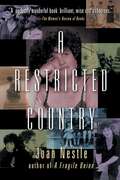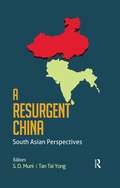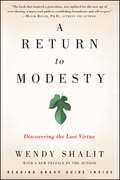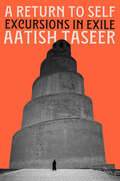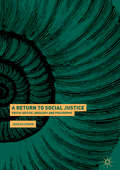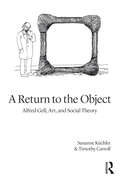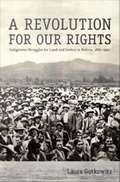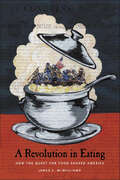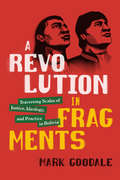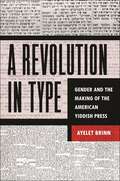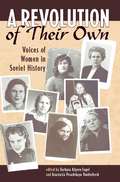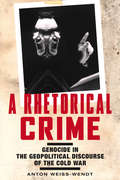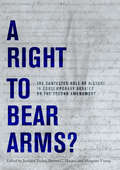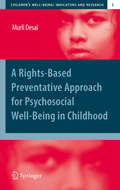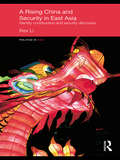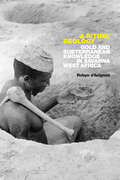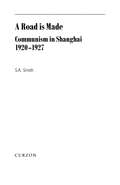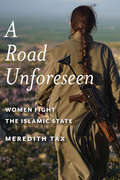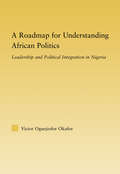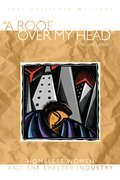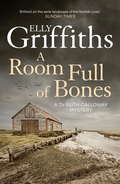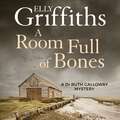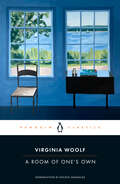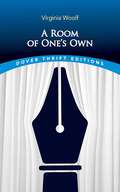- Table View
- List View
A Restricted Country
by Joan NestleA proud working class woman, an "out" lesbian long before the Rainbow revolution, Joan Nestle has stood at the forefront of American freedom struggles from the McCarthy era to the present day. Available for the first time in years, this revised classic collection of personal essays offers an intimate account of the lesbian, feminist, and civil rights movements.
A Resurgent China: South Asian Perspectives
by Tan Tai Yong S. D. MuniBringing together a range of South Asian perspectives on rising China in a comparative framework, an attempt has been made, for the first time, to identify and examine the political, economic and socio-cultural stakeholders and constituencies that influence the respective policy of individual South Asian countries towards China. The essays also project how their mutual relations are likely to be shaped by these. The book is especially relevant today owing to China’s growing weight in Asian and global affairs.
A Return to Modesty
by Wendy ShalitUpdated with a new introduction, this fifteenth anniversary edition of A Return to Modesty reignites Wendy Shalit's controversial claim that we have lost our respect for an essential virtue: modesty.When A Return to Modesty was first published in 1999, its argument launched a worldwide discussion about the possibility of innocence and romantic idealism. Wendy Shalit was the first to systematically critique the "hook-up" scene and outline the harms of making sexuality so public. Today, with social media increasingly blurring the line between public and private life, and with child exploitation on the rise, the concept of modesty is more relevant than ever. Updated with a new preface that addresses the unique problems facing society now, A Return to Modesty shows why "the lost virtue" of modesty is not a hang-up that we should set out to cure, but rather a wonderful instinct to be celebrated. A Return to Modesty is a deeply personal account as well as a fascinating intellectual exploration into everything from seventeenth-century manners to the 1948 tune "Baby, It's Cold Outside." Beholden neither to social conservatives nor to feminists, Shalit reminds us that modesty is not prudery, but a natural instinct--and one that may be able to save us from ourselves.
A Return to Self: Excursions in Exile
by Aatish TaseerA blend of travelog and memoir spanning from Turkey to Mexico, exploring Aatish Taseer&’s uniquely blended identity and asking: Why do certain cities become epicenters of great historical shifts and sites of unpredictable communities?In 2019, the government of Prime Minister Narenda Modi revoked Aatish Taseer&’s Indian citizenship, thereby exiling him from the country where he grew up and lived for thirty years. This loss, both practical and spiritual, sent him on a journey of revisiting the places that formed his identity, and asking broader questions about the complex forces that make a culture and a nationality, in the process. In Istanbul, he confronts the hopes and ambitions of his former self. In Uzbekistan, he sees how what was once the majestic portal of the Silk Road is now a tourist façade. In India, he explores why Buddhism, which originated there, is so little practiced. Everywhere he goes, the ancient world mixes intimately with the contemporary: with the influences of the pandemic, the rise of new food cultures, and the ongoing cultural battles of regions around the world. How do centuries of cultures evolving and overlapping, often violently, shape the people that subsequently emerge from them? In thoughtful prose that combines reportage with romanticism, Taseer casts an incisive eye at what it means to belong to a place that becomes an unstable, politicized vessel for ideas defined by exclusion and prejudice, and gets to the human heart of the shifts and migrations that define our multicultural world.
A Return to Social Justice: Youth Justice, Ideology And Philosophy
by Jessica UrwinYouth justice has always focused on criminal justice but this work argues that taking a social justice approach is the best way to reduce youth crime. Drawing on philosophy, new research, and practitioners’ views, a new organizational structure and approach is developed. Urwin outlines the philosophical and historical background of youth justice and clarifies how this has led to problems within current practice. Prominent debates within the field are also explored in depth, such as care vs. control, and the issue of professional identity. Ultimately, all of these factors are considered in relation to the organizational structure of youth justice, and this bold and engaging study highlights the need for a more principled approach to practice. Timely and authoritative, this book is will be of great interest to youth justice practitioners, academics, students, and those who would like to apply social justice to social institutions.
A Return to the Object: Alfred Gell, Art, and Social Theory
by Timothy Carroll Susanne KuechlerThis book draws on the work of anthropologist Alfred Gell to reinstate the importance of the object in art and society. Rather than presenting art as a passive recipient of the artist's intention and the audience's critique, the authors consider it in the social environment of its production and reception. A Return to the Object introduces the historical and theoretical framework out of which an anthropology of art has emerged, and examines the conditions under which it has renewed interest. It also explores what art 'does' as a social and cultural phenomenon, and how it can impact alternative ways of organising and managing knowledge. Making use of ethnography, museological practice, the intellectual history of the arts and sciences, material culture studies and intangible heritage, the authors present a case for the re-orientation of current conversations surrounding the anthropology of art and social theory. This text will be of key interest to students and scholars in the social and historical sciences, arts and humanities, and cognitive sciences.
A Revolution for Our Rights: Indigenous Struggles for Land and Justice In Bolivia, 1880-1952
by Laura GotkowitzA Revolution for Our Rights is a critical reassessment of the causes and significance of the Bolivian Revolution of 1952. Historians have tended to view the revolution as the result of class-based movements that accompanied the rise of peasant leagues, mineworker unions, and reformist political projects in the 1930s. Laura Gotkowitz argues that the revolution had deeper roots in the indigenous struggles for land and justice that swept through Bolivia during the first half of the twentieth century. Challenging conventional wisdom, she demonstrates that rural indigenous activists fundamentally reshaped the military populist projects of the 1930s and 1940s. In so doing, she chronicles a hidden rural revolution--before the revolution of 1952--that fused appeals for equality with demands for a radical reconfiguration of political power, landholding, and rights. Gotkowitz combines an emphasis on national political debates and congresses with a sharply focused analysis of Indian communities and large estates in the department of Cochabamba. The fragmented nature of Cochabamba's Indian communities and the pioneering significance of its peasant unions make it a propitious vantage point for exploring contests over competing visions of the nation, justice, and rights. Scrutinizing state authorities' efforts to impose the law in what was considered a lawless countryside, Gotkowitz shows how, time and again, indigenous activists shrewdly exploited the ambiguous status of the state's pro-Indian laws to press their demands for land and justice. Bolivian indigenous and social movements have captured worldwide attention during the past several years. By describing indigenous mobilization in the decades preceding the revolution of 1952, A Revolution for Our Rights illuminates a crucial chapter in the long history behind present-day struggles in Bolivia and contributes to an understanding of indigenous politics in modern Latin America more broadly.
A Revolution in Eating: How the Quest for Food Shaped America (Arts and Traditions of the Table Perspectives on Culinary History)
by James E. McWilliamsA colorful, spirited tour of culinary attitudes, tastes, and techniques throughout colonial America. Confronted by unfamiliar animals, plants, and landscapes, settlers in the colonies and West Indies found new ways to produce food. Integrating their British and European tastes with the demands and bounty of the rugged American environment, early Americans developed a range of regional cuisines. From the kitchen tables of typical Puritan families to Iroquois longhouses in the backcountry and slave kitchens on southern plantations, McWilliams portrays the grand variety and inventiveness that characterized colonial cuisine. As colonial America grew, so did its palate, as interactions among European settlers, Native Americans, and African slaves created new dishes and attitudes about food. McWilliams considers how Indian corn, once thought by the colonists as &“fit for swine,&” became a fixture in the colonial diet. He also examines the ways in which African slaves influenced West Indian and American southern cuisine. While a mania for all things British was a unifying feature of eighteenth-century cuisine, the colonies discovered a national beverage in domestically brewed beer, which came to symbolize solidarity and loyalty to the patriotic cause in the Revolutionary era. The beer and alcohol industry also instigated unprecedented trade among the colonies and further integrated colonial habits and tastes. Victory in the American Revolution initiated a &“culinary declaration of independence,&” prompting the antimonarchical habits of simplicity, frugality, and frontier ruggedness to define the cuisine of the United States—a shift that imbued values that continue to shape the nation&’s attitudes to this day. &“A lively and informative read.&” —TheNew Yorker
A Revolution in Fragments: Traversing Scales of Justice, Ideology, and Practice in Bolivia
by Mark GoodaleThe years between 2006 and 2015, during which Evo Morales became Bolivia's first indigenous president, have been described as a time of democratic and cultural revolution, world renewal (Pachakuti), reconstituted neoliberalism, or simply &“the process of change.&” In A Revolution in Fragments Mark Goodale unpacks these various analytical and ideological frameworks to reveal the fragmentary and contested nature of Bolivia's radical experiments in pluralism, ethnic politics, and socioeconomic planning. Privileging the voices of social movement leaders, students, indigenous intellectuals, women's rights activists, and many others, Goodale uses contemporary Bolivia as an ideal case study with which to theorize the role that political agency, identity, and economic equality play within movements for justice and structural change.
A Revolution in Type: Gender and the Making of the American Yiddish Press
by Ayelet Brinn73rd National Jewish Book Awards FinalistA fascinating glimpse into the complex and often unexpected ways that women and ideas about women shaped widely read Jewish newspapersBetween the 1880s and 1920s, Yiddish-language newspapers rose from obscurity to become successful institutions integral to American Jewish life. During this period, Yiddish-speaking immigrants came to view newspapers as indispensable parts of their daily lives. For many Jewish immigrants from Eastern Europe, acclimating to America became inextricably intertwined with becoming a devoted reader of the Yiddish periodical press, as the newspapers and their staffs became a fusion of friends, religious and political authorities, tour guides, matchmakers, and social welfare agencies.In A Revolution in Type, Ayelet Brinn argues that women were central to the emergence of the Yiddish press as a powerful, influential force in American Jewish culture. Through rhetorical debates about women readers and writers, the producers of the Yiddish press explored how to transform their newspapers to reach a large, diverse audience. The seemingly peripheral status of women’s columns and other newspaper features supposedly aimed at a female audience—but in reality, read with great interest by male and female readers alike—meant that editors and publishers often used these articles as testing grounds for the types of content their newspapers should encompass. The book explores the discovery of previously unknown work by female writers in the Yiddish press, whose contributions most often appeared without attribution; it also examines the work of men who wrote under women’s names in order to break into the press. Brinn shows that instead of framing issues of gender as marginal, we must view them as central to understanding how the American Yiddish press developed into the influential, complex, and diverse publication field it eventually became.
A Revolution of Their Own
by Barbara Alpern Engel Anastasia Posadskaya-VanderbeckThe stories of these eight Russian women offer an extremely rare perspective into personal life in the Soviet era. Some were from the poor peasantry and working class, groups in whose name the revolution was carried out and who sometimes gained unprecedented opportunities after the revolution. Others, born to "misfortune” as the daughters of nobles, parish priests, or those peasants termed well-to-do, suffered bitterly as enemies to a new government. The women interviewed here speak candidly about family life, work, sexual relations, marriage and divorce, childbirth and childbearing, and legalized abortion and the underground pursuit of such services after abortion was outlawed in 1936. As no previous book has done, A Revolution of Their Own illuminates the harsh reality of women’s daily lives in the Soviet Union as well as reveals the accomplishments made possible by the expanded opportunities that the new Soviet government provided for women. Their stories show why many Russian women continue to take pride in the public achievements of the Soviet period despite, or perhaps because of, the painful price each was made to pay.
A Rhetorical Crime: Genocide in the Geopolitical Discourse of the Cold War (Genocide, Political Violence, Human Rights)
by Anton Weiss-Wendt Douglas Irvin-EricksonThe Genocide Convention was drafted by the United Nations in the late 1940s, as a response to the horrors of the Second World War. But was the Genocide Convention truly effective at achieving its humanitarian aims, or did it merely exacerbate the divisive rhetoric of Cold War geopolitics?A Rhetorical Crime shows how genocide morphed from a legal concept into a political discourse used in propaganda battles between the United States and the Soviet Union. Over the course of the Cold War era, nearly eighty countries were accused of genocide, and yet there were few real-time interventions to stop the atrocities committed by genocidal regimes like the Cambodian Khmer Rouge. Renowned genocide scholar Anton Weiss-Wendt employs a unique comparative approach, analyzing the statements of Soviet and American politicians, historians, and legal scholars in order to deduce why their moral posturing far exceeded their humanitarian action.
A Right to Bear Arms?: The Contested Role of History in Contemporary Debates on the Second Amendment
by Barton C. Hacker Jennifer Tucker Margaret ViningThis collection of essays explores the way history itself has become a contested element within the national legal debate about firearms. The debate over the Second Amendment has unveiled new and useful information about the history of guns and their possession and meaning in the United States of America. History itself has become contested ground in the debate about firearms and in the interpretation of the Second Amendment to the Constitution of the United States. Specifically this collection of essays gives special attention to the important and often overlooked dimension of the applications of history in the law. These essays illustrate the complexity of the firearms debate, the relation between law and behavior, and the role that historical knowledge plays in contemporary debates over law and policy. Wide-ranging and stimulating The Right to Bear Arms is bound to captivate both historians and casual readers alike.
A Right to Flee
by Phil OrchardWhy do states protect refugees? In the past twenty years, states have sought to limit access to asylum by increasing their border controls and introducing extraterritorial controls. Yet no state has sought to exit the 1951 Refugee Convention or the broader international refugee regime. This book argues that such international policy shifts represent an ongoing process whereby refugee protection is shaped and redefined by states and other actors. Since the seventeenth century, a mix of collective interests and basic normative understandings held by states created a space for refugees to be separate from other migrants. However, ongoing crisis events undermine these understandings and provide opportunities to reshape how refugees are understood, how they should be protected, and whether protection is a state or multilateral responsibility. Drawing on extensive archival and secondary materials, Phil Orchard examines the interplay among governments, individuals, and international organizations that has shaped how refugees are understood today.
A Rights-Based Preventative Approach for Psychosocial Well-being in Childhood (Children’s Well-Being: Indicators and Research #3)
by Murli DesaiChildren are one of the most important phase of human development and the most important target group for social work intervention. Most of the schools of human development and social work round the world have an elective course on children and some offer a concentration in this area. There are plenty of textbooks on intervention with children published by Western authors, focusing on useful theories and skills but mainly at the remedial level. They neither use the preventative approach nor the child rights perspective, which has been found useful in the developing nations. The books on child rights are generally published by the United Nations Children's Fund (UNICEF) and other international organisations working in the field of children such as Save the Children. These books focus on the useful child rights perspective but they neither integrate theories nor use the preventative approach. The proposed book A Rights-based Preventative Approach for Children's Psychosocial Well-Being: will be the first to apply the child rights perspective and the preventative approach to intervention for children's psychosocial well-being. It is an integration of theories with practice and teaching relevant in different parts of the world. The book is divided into the following three parts: Part 1: Introduction to a Rights-based Preventative Approach for Children's Psychosocial Well-Being.- Part 2: Primary Prevention for Children's Psychosocial Well-Being.- Part 3: Secondary and Tertiary Prevention for Children's Psychosocial Well-Being
A Rising China and Security in East Asia: Identity Construction and Security Discourse (Politics in Asia)
by Rex LiThis volume provides a comprehensive and in-depth analysis of the security discourse of Chinese policy elites on the major powers in East Asia in relation to China’s self-perception as a rising power. It is the first book-length study that utilizes International Relations theories systematically to analyze Chinese security perceptions of the United States, Japan and Russia, and the debate among Chinese international relations specialists on how China should respond to the perceived challenge from the major powers to its rise to a global status. Rex Li argues that the security discourse of Chinese policy analysts is closely linked to their conception of China’s identity and their desire and endeavour to construct a great power identity for China. Drawing on extensive and up-to-date Chinese-language sources, the study demonstrates that Chinese elites perceive the power, aspirations and security strategies of other East Asian powers primarily in terms of their implications for China’s pursuit of great power status. This new work will contribute significantly to the on-going academic and policy debate on the nature and repercussions of China’s rise. This book will be essential reading for undergraduate and postgraduate students and scholars of Asian security, China’s foreign relations, security studies and international relations.
A Ritual Geology: Gold and Subterranean Knowledge in Savanna West Africa
by Robyn d'AvignonSet against the ongoing corporate enclosure of West Africa’s goldfields, A Ritual Geology tells the untold history of one of the world’s oldest indigenous gold mining industries: Francophone West Africa’s orpaillage. Establishing African miners as producers of subterranean knowledge, Robyn d’Avignon uncovers a dynamic “ritual geology” of techniques and cosmological engagements with the earth developed by agrarian residents of gold-bearing rocks in savanna West Africa. Colonial and corporate exploration geology in the region was built upon the ritual knowledge, gold discoveries, and skilled labor of African miners even as states racialized African mining as archaic, criminal, and pagan. Spanning the medieval and imperial past to the postcolonial present, d’Avignon weaves together long-term ethnographic and oral historical work in southeastern Senegal with archival and archeological evidence from Burkina Faso, Côte d’Ivoire, Guinea, and Mali. A Ritual Geology introduces transnational geological formations as a new regional framework for African studies, environmental history, and anthropology.
A Road Is Made: Communism in Shanghai 1920-1927 (Chinese Worlds)
by Steve SmithThis is a study of the activities, ideas and internal life of the Chinese Communist Party in Shanghai during its formative period. It investigates the party's relations to the city's students and teachers, women, entrepreneurs, secret societies and its workers, and examines the efforts to transform the CCP into a 'Leninist' party, exploring relations between intellectuals and workers, men and women, Chinese and Russians within the party. The book culminates in a detailed analysis of the three armed uprisings which led to the CCP's briefly taking power in March 1927, before being crushed by troops loyal to Chiang Kai-shek. The study highlights the extent to which the Soviet Union sought to manipulate China's national revolution, yet also reveals how divisions at every level of the Comintern allowed the CCP to achieve a degree of independence and to conduct policy at considerable variance with that laid down by Moscow.
A Road Unforeseen: Women Fight the Islamic State
by Meredith Tax"This is the book I've been waiting for-only it's richer, deeper, and more intriguing than I could have imagined. A Road Unforeseen is a major contribution to our understanding of feminism and Islam, of women and the world, and gives me fresh hope for change." -Barbara Ehrenreich, author of Nickel and Dimed and Living With a Wild GodIn war-torn northern Syria, a democratic society-based on secularism, ethnic inclusiveness, and gender equality-has won significant victories against the Islamic State, or Daesh, with women on the front lines as fierce warriors and leaders.A Road Unforeseen recounts the dramatic, underreported history of the Rojava Kurds, whose all-women militia was instrumental in the perilous mountaintop rescue of tens of thousands of civilians besieged in Iraq. Up to that point, the Islamic State had seemed invincible. Yet these women helped vanquish them, bringing the first half of the refugees to safety within twenty-four hours.Who are the revolutionary women of Rojava and what lessons can we learn from their heroic story? How does their political philosophy differ from that of Iraqi Kurdistan, the Islamic State, and Turkey? And will the politics of the twenty-first century be shaped by the opposition between these political models?Meredith Tax is a writer and political activist. Author, most recently, of Double Bind: The Muslim Right, the Anglo-American Left, and Universal Human Rights, she was founding president of Women's WORLD, a global free speech network of feminist writers, and cofounder of the PEN American Center's Women's Committee and the International PEN Women Writers' Committee. She is currently international board chair of the Centre for Secular Space and lives in New York.
A Roadmap for Understanding African Politics: Leadership and Political Integration in Nigeria (African Studies)
by Victor Oguejiofor OkaforThis book examines the impact of post-colonial leadership on political integration in Nigeria, offering an in-depth understanding of the historical and contemporary forces that shape Nigeria's national politics as well as African politics generally. Okafor discusses how Nigeria's pre-colonial and colonial political histories along with contemporary external forces like neo-colonialism, as well as internal social, economic and political structures and developments, have affected emerging post-independence politics in the country. The study climaxes with an Africa-centered theory of political and integrative leadership and then uses it as a prism for analyzing six Nigerian post-independence political leaderships, encompassing Nigeria's First and Second Republics, along with their military interregna. The concluding chapter includes a discussion of the implications of the study for leadership and political integration in Africa in general.
A Roof Over My Head, Second Edition: Homeless Women and the Shelter Industry
by Jean Calterone WilliamsBased upon extensive ethnographic data, “A Roof Over My Head” examines the lives of homeless women who cope with domestic violence, low-income housing shortages, and poverty. The author draws upon interviews with homeless women, interviews with housed people, and, finally, evaluations of shelter services, philosophies, and policies to get at the causes and social constructions of homelessness. “A Roof Over My Head” is a groundbreaking study that unveils the centrality of abuse and poverty in homeless women’s lives and outlines ways in which societal responses can and should be more effective. The second edition explores recent attempts to integrate homeless and battered women’s shelters and recent research on domestic violence as a cause of homelessness. It contains a new introduction that analyzes the most recent homeless policy developments and paints a picture of the homeless population today. With updated statistics and policy information throughout, the second edition of “A Roof Over My Head” illustrates why ending homelessness in the United States continues to present a thorny and complex challenge.
A Room Full of Bones: The Dr Ruth Galloway Mysteries 4 (The Dr Ruth Galloway Mysteries #4)
by Elly GriffithsHalloween night, and the dead are closer than ever for Dr Ruth Galloway. She is used to long-dead bodies, but a fresh corpse in the middle of a museum is a new challenge. 'My favourite current series' Val McDermid'A wonderfully rich mix of ancient and contemporary' GuardianIt is Halloween in King's Lynn, and forensic archaeologist Dr Ruth Galloway is attending a strange event at the local history museum - the opening of a coffin containing the bones of a medieval bishop. But then Ruth finds the body of the museum's curator lying beside the coffin. Soon the museum's wealthy owner lies dead in his stables too. These two deaths could be from natural causes but DCI Harry Nelson isn't convinced, and it is only a matter of time before Ruth and Nelson cross paths once more. When threatening letters come to light, events take an even more sinister turn. But as Ruth's friends become involved, where will her loyalties lie? As her convictions are tested, she and Nelson must discover how Aboriginal skulls, drug smuggling and the Aboriginal ritual of The Dreaming may hold the answer to these deaths - and be the key to their own survival.
A Room Full of Bones: The Dr Ruth Galloway Mysteries 4 (The Dr Ruth Galloway Mysteries #4)
by Elly GriffithsWINNER OF THE 2016 CWA DAGGER IN THE LIBRARY. Halloween night, and the dead are closer than ever for Dr Ruth Galloway. She is used to long-dead bodies, but a fresh corpse in the middle of a museum is a new challenge. The fourth beguiling Dr Ruth Galloway mystery.'A wonderfully rich mix of ancient and contemporary' GuardianIt is Halloween in King's Lynn, and forensic archaeologist Dr Ruth Galloway is attending a strange event at the local history museum - the opening of a coffin containing the bones of a medieval bishop. But then Ruth finds the body of the museum's curator lying beside the coffin. Soon the museum's wealthy owner lies dead in his stables too. These two deaths could be from natural causes but DCI Harry Nelson isn't convinced, and it is only a matter of time before Ruth and Nelson cross paths once more. When threatening letters come to light, events take an even more sinister turn. But as Ruth's friends become involved, where will her loyalties lie? As her convictions are tested, she and Nelson must discover how Aboriginal skulls, drug smuggling and the Aboriginal ritual of The Dreaming may hold the answer to these deaths - and be the key to their own survival.
A Room of One's Own
by Virginia WoolfA collectible hardcover edition of Virginia Woolf&’s pioneering work of feminism, &“probably the most influential piece of non-fictional writing by a woman in [the twentieth] century&” (Hermione Lee), featuring a new introduction by Xochitl Gonzalez, Pulitzer Prize finalist and New York Times bestselling author of Olga Dies Dreaming and Anita de Monte Laughs LastA Penguin Vitae EditionIn October 1928, Virginia Woolf delivered two lectures to the women&’s colleges at the University of Cambridge, arguing with inimitable wit and rhetorical mastery that an income and a room of one&’s own are essential to a woman&’s creative freedom. These lectures became the basis for A Room of One&’s Own, a landmark in feminist thought, in which Woolf imagines the fictional Judith Shakespeare, sister to William and equally gifted but lost to history. How much genius has gone unexpressed, Woolf wonders, because women are not afforded the same privileges as men? A hundred years later, her brilliant polemic reverberates into our own time.In this edition, Pulitzer Prize finalist for commentary and bestselling novelist Xochitl Gonzalez contributes an introductory essay that extends the argument to Woolf&’s housekeeper, breaking down divides of not only gender but also race and class in order to include all women in Woolf&’s profoundly inspiring call to realize their creative potential.Penguin Vitae—loosely translated as &“Penguin of one&’s life&”—is a deluxe hardcover series from Penguin Classics celebrating a dynamic and diverse landscape of classic fiction and nonfiction from seventy-five years of classics publishing. Penguin Vitae provides readers with beautifully designed classics that have shaped the course of their lives, and welcomes new readers to discover these literary gifts of personal inspiration, intellectual engagement, and creative originality.
A Room of One's Own (Dover Thrift Editions: Literary Collections)
by Virginia WoolfVirginia Woolf unveils the societal barriers faced by women and explores the crucial link between women's financial independence and creative freedom in this extraordinary collection of essays. Initially presented as lectures in 1928 at Newnham College and Girton College, the University of Cambridge's women's colleges, this seminal work argues for a literal and figurative space for women writers within a patriarchal literary tradition. Woolf's essays constitute a foundational feminist text, highlighting the historical marginalization of women, advocating for equality, and emphasizing the importance of women's contributions to literature and beyond. Essential reading for anyone interested in feminism, literature, and women's history, A Room of One's Own resonates profoundly in today's ongoing gender discussions.
